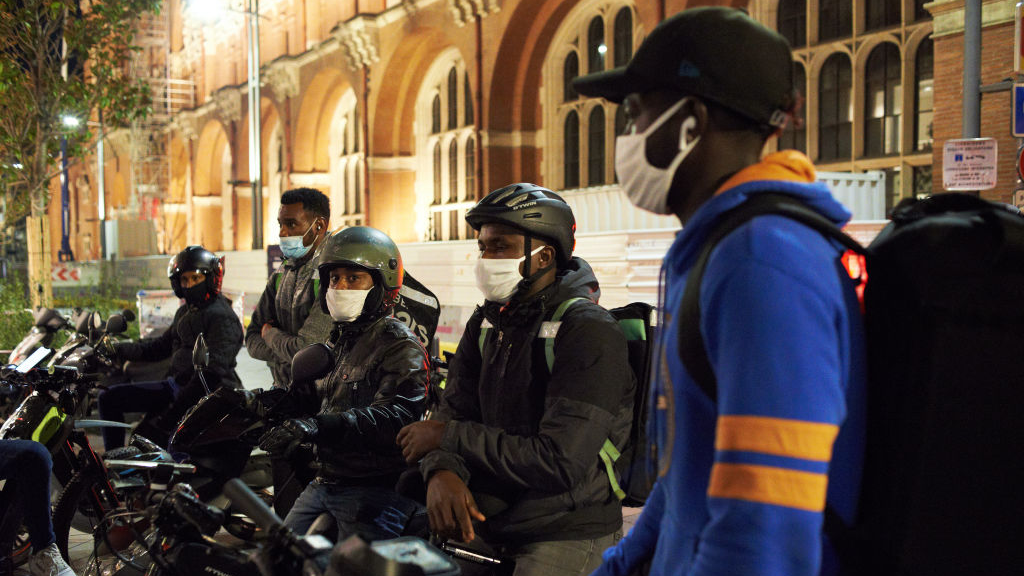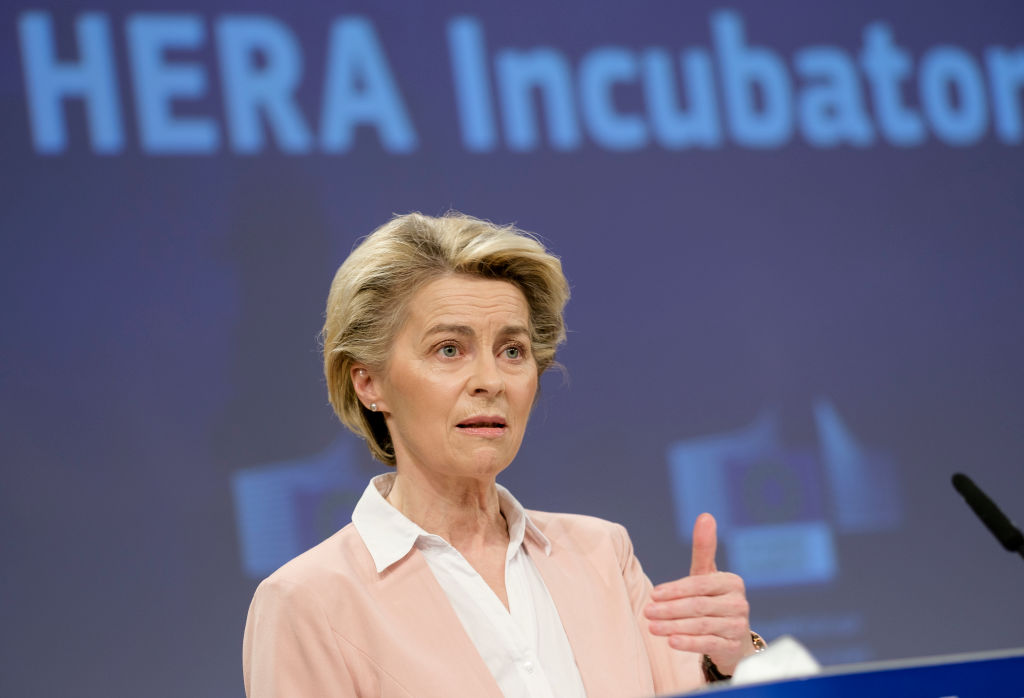
Delivery workers wait for their orders during the COVID-19 curfew, February 25, 2021. /Getty
Delivery workers wait for their orders during the COVID-19 curfew, February 25, 2021. /Getty
Editor's note: Freddie Reidy is a freelance writer based in London. He studied history and history of art at the University of Kent, Canterbury, specializing in Russian history and international politics. The article reflects the author's opinions and not necessarily the views of CGTN.
As European leaders met virtually to discuss the COVID-19 vaccination program and scrutinize drug manufacturing executives, the bloc appears tangled in a Gordian knot of its own creation.
COVID-19 has tested many of the core principles of the European Union (EU), the freedom of movement, goods, medical supplies, and the procurement of vaccines have all encountered impediments and fallen victim to the unilateral actions of member states.
Having initially recovered from a slow start in responding from the crisis, the EU has struggled with the rollout of its vaccination program as well as encountering multiple issues in certification and procurement. There is also a political dimension to the issue, with the United Kingdom, recently departed from the EU, serving as a perpetual point of comparison.
As a point of difference, the EU, in particular Germany and France began with high levels of vaccine hesitancy, potentially hampering rapid adoption, in France 38 percent had said they would not be willing to receive a vaccination.
A delayed start in vaccine certification and procurement caused European shortages leading to a high-profile dispute between the European Commission and AstraZeneca over contract fulfillment and supply chain issues. The dispute caused a diplomatic incident with the EU enacting emergency protocols on the Irish boarder with the United Kingdom in a bid to prevent vaccine shipments leaving the bloc.
The move, which was reversed, drew sharp criticism from all quarters including the World Health Organization and sparked concern over widespread vaccine nationalism.
While the EU was fighting to secure doses of the vaccine, French President Emmanuel Macron was raising question marks over the vaccine's efficacy, claiming it to be "quasi-ineffectual" focusing particularly on its use with over 65s. These remarks were made just hours ahead of the European Medicines Association certifying efficacy in all age groups. The damage though appeared to be done, with adding to the latent vaccine hesitancy.
Today, the French Health Ministry conceded that uptake of the vaccine was "feeble" and that the inoculation was suffering from an "image deficit" which they are keen to "rehabilitate" at a time where cases in the country are on the rise.
In Germany too, the Oxford University – AstraZeneca vaccine is not being rolled out to over 65s. Such policy stances raise serious questions over the logic of having a pan-European vaccination initiative, but with dual certification.
A tautology adroitly exemplified by Commission President Ursula von der Leyen who declared that "the vaccine has been carefully examined, found to be safe and effective, and approved." Continuing that she would "take the AstraZeneca vaccine without a second thought."

President of the European Commission Ursula von der Leyen attends a press conference in the Berlaymont, the EU Commission headquarter in Brussels, Belgium, February 17, 2021. /Getty
President of the European Commission Ursula von der Leyen attends a press conference in the Berlaymont, the EU Commission headquarter in Brussels, Belgium, February 17, 2021. /Getty
Meanwhile, German Chancellor Angela Merkel was forced to concede that she would not take the vaccine as an example, as she does not "belong to the recommended age group." No doubt raising further doubts.
While only weeks ago many German politicians were calling for strict controls over vaccine exports, The Robert Koch Institute reported that of the 1.5 million vaccines delivered last week, only 187,000 had been used.
The political tension also appears constant perhaps preventing more objective messaging. The German newspaper Bild ran a headline on February 23 proclaiming "Dear Brits, we envy you!" as the UK announced plans for easing the lockdown, aided by a rapid vaccine rollout. Chancellor Merkel meanwhile indicated further lockdown measures were on the horizon.
In a bid to restore parity, French EU Affairs minister, Clement Beaune told France2 TV, that "It is said that 25 percent of the British population has been vaccinated, this is not correct."
"When we look at the number of people who have a full vaccination (two doses) the UK is behind many countries in the EU," he added.
European Commission President Ursula von der Leyen also remarked that she thought the delay between vaccines was "risky."
These distinctions contradict a University of Oxford study which showed a delay between shots increased effectiveness from 55 percent at six weeks, to 81 percent after twelve weeks.
Beyond the post-Brexit political intrigue and bureaucratic challenges facing the EU, the wider issue is that Western nations have failed to manage the pandemic with the same degree of efficiency as many Asian counterparts such as China, Singapore, or Vietnam. It is this failing that placed such a premium on an efficient vaccine rollout.
However, it would appear that many of the present issues were entirely avoidable. The EU must, therefore, rapidly clarify its messaging and prevent widespread vaccine hesitancy which risks lives and a broader recovery.
(If you want to contribute and have specific expertise, please contact us at opinions@cgtn.com.)

